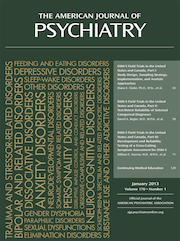Lithium Treatment Moderate-Dose Use Study (LiTMUS) for Bipolar Disorder: A Randomized Comparative Effectiveness Trial of Optimized Personalized Treatment With and Without Lithium
Abstract
Objective
Lithium salts, once the mainstay of therapy for bipolar disorder, have tolerability issues at a higher dosage that often limit adherence. The authors investigated the comparative effectiveness of more tolerable dosages of lithium as part of optimized personalized treatment (OPT).
Method
The authors randomly assigned 283 bipolar disorder outpatients to 6 months of open, flexible, moderate dosages of lithium plus OPT or to 6 months of OPT alone. The primary outcome measures were the Clinical Global Impression Scale for Bipolar Disorder–Severity (CGI-BP-S) and “necessary clinical adjustments” (medication adjustments per month). Secondary outcome measures included mood symptoms and functioning. The authors also assessed sustained remission (defined as a CGI-BP-S score ≤2 for 2 months) and treatment with second-generation antipsychotics. The authors hypothesized that lithium plus OPT would result in greater clinical improvement and fewer necessary clinical adjustments.
Results
The authors observed no statistically significant advantage of lithium plus OPT on CGI-BP-S scores, necessary clinical adjustments, or proportion with sustained remission. Both groups had similar outcomes across secondary clinical and functional measures. Fewer patients in the lithium-plus-OPT group received second-generation antipsychotics compared with the OPT-only group (48.3% and 62.5%, respectively).
Conclusions
In this pragmatic comparative effectiveness study, a moderate but tolerated dosage of lithium plus OPT conferred no symptomatic advantage when compared with OPT alone, but the lithium-plus-OPT group had less exposure to second-generation antipsychotics. Only about one-quarter of patients in both groups achieved sustained remission of symptoms. These findings highlight the persistent and chronic nature of bipolar disorder as well as the magnitude of unmet needs in its treatment.



